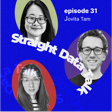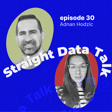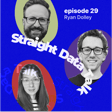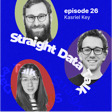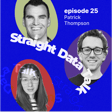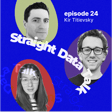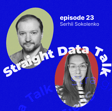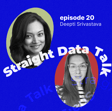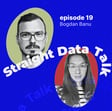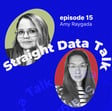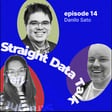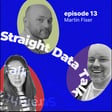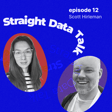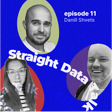Introduction and Guest Reintroduction
00:00:00
Speaker
Hi all, um it's Yulia from Straight AD Talk and today I'm happy to host Andriy Yeseniewski, who is friend of mine. And um yeah, Andriy, jump in introduce yourself. um yeah Yeah, thank you for inviting me
Andriy's Company and Mission
00:00:18
Speaker
It's been exactly almost a year since we recorded the first time. Yeah, oh yeah, you are right. And yeah, I was traveling back then. um I'm a co-founder and CTO a company, which we just recently announced.
00:00:34
Speaker
I've been working on it for a long time, for almost a year. um and ah we're focusing now on the healthcare and the AI applications in the healthcare space, specifically on the metabolic problems and hormonal problems, which affect a lot of people in the U.S. in particular.
00:00:52
Speaker
um And we've started with a mission to help solve the pre-diabetes epidemic that's happening in the U.S., largely globally as well, but ah we we're starting with the U.S. market.
00:01:05
Speaker
um And ah since then, since we started, we evolved into of a comprehensive kind of metabolic and hormonal solution for people who have um all kinds of symptoms that stem from disbalances and metabolism and hormones, which affect basically pretty much, I don't know, like 80% of what's happening in in our bodies, um especially ah it affects a lot of women ah as well.
00:01:35
Speaker
and um hormones in particular, and we're building a comprehensive solution.
AI in Healthcare Apps
00:01:40
Speaker
So we're basically helping people to root cause their symptoms ah with our comprehensive AI lab assessment. ah this is This is how you start.
00:01:53
Speaker
ah This is the start of the journey. ah We run a ah deep assessment. ah for you, and then we prescribe a number of tests to root cause it further.
00:02:04
Speaker
And then um over time, basically, we get a certain, we narrow down the problems, the potential causes, right? And then the application, which is now in the App Store, it's called the idea health.
00:02:16
Speaker
ah the ah the the application then becomes sort of like the auxiliary. Like it's it's your day-to-day system, system that already knows a lot of information about you.
00:02:28
Speaker
um You can use the glucose monitor as well and we know your sleep, we know your exercise routines and all these things. we combine this with your biomarkers and our proprietary and of AI engine that can interpret all this information, which, by the way, no other doctor can properly um evaluate and comprehend. you know It's just a lot of information.
Personalization in Healthcare Assessments
00:02:50
Speaker
it's not like it's And also, we're using our proprietary biomarker ranges.
00:02:56
Speaker
So one of the problems is that when you show up in the doctor's office and they give you your labs, Yeah. um Oh, like, you know, ah this and that is normal. So like, you're fine, but you may be not fine, like far from that, or you may be in the trajectory to not being fine.
00:03:13
Speaker
ah very soon. And ah many of those ranges are actually just defined as averages on the large ah large population. They're not personalized. and that's That's one of the big problems that we have in healthcare care in general, not just in the US, but overall.
00:03:29
Speaker
yeah All those ranges and um um ah understanding of someone's health isn is far from being personalized. It's very genetic. It's average average population, yeah average ah male, average female, cetera, average group age groups.
00:03:46
Speaker
And um that really does not help. ah so Oftentimes, you know, we know that something is wrong in our body, but the labs show that everything's fine. And that's, that's like one of the first steps we're trying to address.
00:03:59
Speaker
And then the app ah becomes your, your day to day partner effectively. Gosh, so crazy. You can still work with doctor, but it's way more personalized. you know You know, the way you describe it, it instantly, ah like I instantly want, you know, to to download the app and and like I have my um analytics, just how they call it in Spain, like lab results analytics.
00:04:24
Speaker
um Yeah, i wish I wish I
Regulatory Challenges and App Availability
00:04:27
Speaker
could use it. Yeah, unfortunately, it's only available in US right now, right? and mean Do you want to talk about the reasons why it's only available in US?
00:04:36
Speaker
ah Healthcare is very ah peculiar space. I would say there's a lot of regulations, a lot of constraints ah and things that we have to comply with. And um but yeah launching in the US market is is difficult in its own. We're still a small startup.
00:04:54
Speaker
We have a team of about nine people now. And um there's a lot of kind of challenges and problems to solve in the US market first before we can roll this out, you know, other, other countries.
00:05:10
Speaker
Um, it's difficult and so on, I would say given, uh, healthcare care is is such a sensitive, uh, space to be in, in the first place. Yeah. That's interesting. saying Listen, Andrew, I personally admire you and I think that you are one of the smartest people I know. um And ah I mean, you're my go-to person when it comes to AI and all the deep, deep tech things.
00:05:38
Speaker
um So first of all, the reason why invited you today is, um you know, to have a... yeah I'd like to make sense of AI today because just to be frank with you, and this is hilarious, um one of the ah data solutions on the market, the founder who I connected with on LinkedIn, they are boosting right now at the Gartner Summit in Orlando.
Media vs. Reality in AI Adoption
00:06:03
Speaker
I guess in Orlando. First of all, you can and understand they have enough of money, shout out to them. But do also the point the guy made is that the gardener is talking about, okay, this is the time of AI engines.
00:06:18
Speaker
That's it. and And, you know, like we are skyrocketing, we just about to launch the rocket to the ah you know to space. with AI agents, so on and so forth.
00:06:28
Speaker
And then this guy goes, but you know, all the talks that we have at our booth are like, okay, we were recently migrated to Databricks, not recently, like five years, but we still be creating.
00:06:40
Speaker
did The level of talks, you know, is different. to what the media and tech media are talking about. And I don't want to take a lot of so time you know talking about it, but the same I observed with organization we are partnering with.
00:06:56
Speaker
There is a big organization and Google gives them like a huge shout out. And, you know, I approached them and I was like, oh gosh, we're so much out of league for them. Like they are so fancy AI and all this stuff.
00:07:11
Speaker
And then we were lucky enough to get, you know, to their native person in contact, they implemented Mashead and we saw everything inside out. Like ah we we understand how they are working and the marketing is far more better than the things in reality.
00:07:27
Speaker
Well, that's ah that's very typical for any new new space, new wave, whatever you call it. um but We've seen this happening over and over again and in tech, and I'm sure in other industries it's the same.
00:07:40
Speaker
um follow like We as a human, we follow almost the same pattern. and like yeah Whenever there's a new wave, there's a lot of hype, there's a lot of marketing talk, and things et cetera. Even in the 2000s and during the internet boom,
00:07:53
Speaker
It was basically the same same kind of narrative. And i'm I'm pretty sure I wasn't here back then, ah but I'm pretty sure that ah behind the scenes it looked almost the same.
00:08:06
Speaker
ah that That's one one of the reasons why so many companies crumbled, basically, ah because they didn't have enough substance to survive um and the market crashed ultimately. right okay um and so ah we we've seen this over and over again in social media and then when the sorry not in social media but the mobile platforms and then social media mobile platforms enabled a lot of thousands and hundreds of thousands of developers to build apps in the app store and then android and then it was the same hype and then kind of like
00:08:39
Speaker
we've seen ah just a few companies solidified in this top 10 charts within any kind of category if you slice it, right?
AI's Foundational Potential
00:08:51
Speaker
um And then there there there is there's App for for this and App for that, if you remember. There's App for everything. um I feel like it's still the same. ah point um Yeah, but it's it's ah moved on to be more kind of spread across different platforms, right? We we have... web dominating lot of the SaaS and um even things like healthcare and other other ah spaces.
00:09:18
Speaker
Web still is still dominating or basically we went back to what's useful and humans and consumers, users always fall back to what's the most useful and practical. Anyway, and so then we we saw the same in crypto and ah there's a lot of Hive. Hive. Hive, yes.
00:09:37
Speaker
Painful. and then and and then And then AI is basically the same, exactly the same dynamic dynamics, exactly the same pattern. ah The difference is that um AI on its own, um I think represents a more foundational kind of platform shift in general.
00:09:56
Speaker
So if if previous waves were more or less incremental improvements on top of the existing infrastructure, like the internet, like web, for example, or even like you can go over in the platform stack and talk about like protocols and the IP protocol, development of the IP protocol and those kinds of things. um the AI represents a similar um paradigm shift, similar to what happened with these um
00:10:27
Speaker
the invention of the semiconductors and like transistors, essentially, era, which kicked off the personal computer era. that's that That's roughly though the the size of what's happening with the AI, but just much bigger ah than that.
00:10:41
Speaker
And it's going to transform practically like any any industry you can think of. And yes, on the background, of course, there is a lot of because there is a lot of hype um and a lot of capital ah flowing your around, it's easy to raise money in the AI space, especially if you apply if you insert agent somewhere. That immediately wins you several points.
00:11:06
Speaker
But I guess the biggest hurdle, like, okay, those kids that are smart and and en enthusiastic enough can go and, you know, raise money, go into the YC. Like, I have so much appreciation for them because sometimes, you know, I just open up, wow, this problem exists and they're making it. This is exciting.
AI Strategies and Google's Challenges
00:11:25
Speaker
um Yeah, that is for sure. But I'm trying to talk about the enterprise. this is the world where I'm right now. They have you know tons of operational data. They have this bureaucracy in place. They have these people who are still you know living in a spreadsheet and operating the spreadsheet level, which is a great solution, by the way.
00:11:46
Speaker
ah But how do you make sense? you know How, as a beginner, ah and would you suggest how to make sense of it like Not which resources to read, but how...
00:12:01
Speaker
It's not even the question about which courses for you you know to get to educate yourself, but how do you make sense in your business? What are the best use cases? And I understand that you don't know that either, but how would you in general treat that fundamental shift that is happening right now if you were to work in enterprise?
00:12:21
Speaker
Hmm. Well, I think as in any platform shift, you just have to rethink ah your entire strategy. There is a big difference, by the way, between the so-called AI-first companies and oh the companies that just snap AI as an afterthought on top of the existing product. and is they're drastically different.
00:12:45
Speaker
Why? User experience, et cetera. Because AI requires a ah mind shift in terms of like how you approach the problem, how you approach solving the problem.
00:12:57
Speaker
oh Yeah. And we've seen a lot when big companies ah just snap AI somewhere in their slide deck and on the and the second slide. and You know, if they're if they're presenting their 2027 strategy to the port and AI is like...
00:13:15
Speaker
item number five um um the on the slide. And we can see as ah as a user, when you get to experience those products, ah they they ah don't look exactly the same as the companies who took a step back and rethought the and everything they've done in the past, I don't know, 10 years.
00:13:37
Speaker
And then rebuild or integrated at least ah AI being the core kind of component in the product. I think Notion has done pretty great job at this and essentially integrated AI kind of like seamlessly into everything they had and they've done it properly.
00:13:57
Speaker
ah Yeah, and they've they've done it properly such that it's not intrusive It doesn't change the experience for users who used to use their their product ah for so many years.
00:14:08
Speaker
And at the same time, um ah helps you along the way as easy goes with the product. You can use it anytime. It makes the experience ah more seamless and easier. ah that that's That's a good example.
00:14:24
Speaker
um And then maybe some bad examples is when, and I don't want to No, do not name them, please. not Like Google, for example. But um I think Google is definitely winning on the tech side.
00:14:36
Speaker
And Jim and I model is great, um especially the pro version. And Jim and I Flash 2.0 that they just released recently in public. ah those ah Those models are amazing. And Google has all the They are one of the few companies that are vertically integrated in some way. They have their own chip, right? The CPU. Yeah.
00:14:59
Speaker
um They have their proprietary software stack that they don't have been building for years, ah almost like over decade, I would say, and polishing and integrating into all kinds of products, including search. Search is one of the primary use cases for Gen HD VI, even if there was there was like actually a great podcast with Jeff Dean maybe a couple of weeks ago, where he talked about ah trading kind of like a early versions of a very similar architecture to the Transformer, but way back ah in a day, like way before the Transformer architecture officially was released.
00:15:40
Speaker
So Google was way ahead of its time this whole time. but but And it's still it's still the case. They have the one of the largest data sets. And if you combine this with YouTube, that's ah that's just a as one of the... Mind-blown.
00:15:55
Speaker
Probably the strongest cases in the AI can probably make at the at the moment. But if you look at the application layer, and ah that's completely on the opposite end of this.
00:16:08
Speaker
And if you if you try using, for example, Gemini somewhere in your Google workspace and say like, hey, can you help me refine this slide ah and make it, i don't know, like more professional or like add some more context here.
00:16:21
Speaker
99% of the cases you'll get, I can't help with that. Like okay but basically how bad it can be, right? And that's, but that's the application layer. That's probably, um ah that's ah that's enought thoughtught that's another thought of some exec basically ah wanting to win a few points on the I don't know, promo packet or whatever and AI was definitely a number five bullet point on the slide deck that they were presenting to the leadership of what they're going to work on in the next quarter or two or three
00:16:56
Speaker
i I just wanted to share a couple of things regarding Google and AI and, um you know, with Google Cloud partners and everything, but partnership aside, I'm trying to say that we work a lot in the Google Cloud data ecosystem.
00:17:09
Speaker
There's a majority of companies out there, but the case the recent recent case was for me, i needed to make a fancy, little fancy, but a decent looking table that I can...
00:17:20
Speaker
ah hope like I had the data, but I need to make it transform that into a table, like not making fun with Excel you know ah spreadsheet, I mean, into to to make it look decent. I asked Gemini and it just put in a snap.
00:17:34
Speaker
It gave me back ah pencil a pencil looking table while Claude and OpenAI um ChatGPT paid version didn't manage to so I was quite excited about that on a personal side but um i get you what you're saying about application of Gemini in Google Cloud because I also was a dev day where they were trying to mo trying to to and engage with developers and let them you know code something to build some application flawlessly.
00:18:07
Speaker
And their very highlight of the dev day was, folks, try It's going to work at some point. You just need to keep trying, which I can understand, which is good enough.
00:18:23
Speaker
google Google is moving very quickly and they're putting a lot of effort and changes into pretty much the entire stack, optimizing the full stack and speed of inferencing, the um time compute, ah time inferencing scaling. the They're very deep in in this kind of... ah layer and I have a few friends who are working on um different parts of this stack even as like as as low as the compiler optimization for like um optimizing this compute at the the at the hardware level level yeah ah and ah i'm I'm pretty bullish on
00:19:02
Speaker
the tech side of of Google over a long period of time with Gemini and other products.
AI Adoption in Enterprises
00:19:09
Speaker
ah But Google has already ah has always been week on the product side.
00:19:14
Speaker
it It's just, ah it's Google. um It's hard. Let's put it this way. The products are hard. Yeah. yeah
00:19:23
Speaker
I see. no ah but But do you realize if we're talking about implementing AI at Google, where top of minds are working, obviously, like um there but like you know there are lots of smart people working there, and it's hard for them to implement it perfectly and seamlessly.
00:19:45
Speaker
what but What does the rest like should do? Smaller companies, it's actually easier. It's always been like that, right? it's the we're You're basically talking about the typical innovator dilemma and um someone who is scrappy enough and can use all the...
00:20:06
Speaker
modern tools and are not afraid to launch something early, maybe not very well polished and experimental, will be way ahead or will move faster than some of those incumbents.
00:20:19
Speaker
And thats that basically has always been the case in the history of tech. So, okay, I have a question. What would be your stack or suggestion for somebody in, you know, mid-size company, mid-size organization to, a and they are willing to test things?
00:20:37
Speaker
Let's say they are technical enough. What would be your stack and and solutions to go to start with? And you can specify the problem yourself because I totally understand that the models are designed and better to solve different problems.
Prompt Engineering and AI Workflows
00:20:53
Speaker
I think it's highly it highly depends on what you're actually building because the answer may be different. Yeah. But if you are building some kind of a SaaS and then there are workflows and you want to optimize this, you want to make AI part of this workflow for your users, your customers,
00:21:09
Speaker
or if you want to integrate AI into existing product and then there is ah there are known workflows that AI can solve more easily and provide more value.
00:21:21
Speaker
um For example, don't know, maybe you have product that looks at the logs, right? you Like maybe in your case, um you have all this data and then making sense of this data, this is exactly where AI can be very helpful.
00:21:34
Speaker
ah to the end the user. I think the biggest ROI at this level, at the application level, ah is learning all the possible techniques of prompt engineering. um and So it's real. Prompt engineering is real.
00:21:50
Speaker
Yeah, well, ah that's the primary interface right now that the most developers are using when using the models. um ah Level lamps, let's let's yeah clarify.
00:22:04
Speaker
And so... that's the since it's That's the primary interface. You need to know exactly ah how to use it, especially given that it's a natural language interface and ah changing a single word can have a big impact on the output um because it's the it's the essentially the interpretation of prediction of tokens and what you put in um highly influences what do you get out.
00:22:35
Speaker
on the other end. And so learning all the techniques of prompt engineering, and I'm not talking about just like how to write prompt in English properly. um But it's more about ah various techniques like chain of thought, tree of thought, knowledge graphs,
00:22:52
Speaker
um all kinds of techniques that ah use some of these in combination. um deep Deep research pattern, for example, it's an emerging pattern that we've seen OpenAI launched and ah Gemini launched, XAI recently launched as well.
00:23:17
Speaker
um And this but we'll see more and more of this evolving over time when models have the capability to think longer before ah generating the response.
00:23:29
Speaker
And you are learning how to use all these tools and techniques, ah function calling, for example, right? So you can prompt the model in such a way that the model would know that it needs to call a certain function and it will pause and will hand over the execution to your application execute the function and then provide result back into the model.
00:23:52
Speaker
So that's now that's not a technique that is highly used and it's integral part of any kind of and agent architecture. ah Agents essentially is the assemble of tools and LLMs, basically. That's what it is.
00:24:03
Speaker
And then... Like an orchestration with proper input, right? Orchestration, exactly. And so ah the deep research effectively is that in the loop. So basically, ah you have an agent or a group of agents, and they know how to collaborate with each other, right? you have You have assigned different roles to your ah to those sub-agents, and those sub-agents have access to different kinds of tools.
00:24:27
Speaker
that you've implemented. And then you've defined some orchestration approach, the workflow, how they should communicate to each other and like what are the inputs, outputs, right?
00:24:40
Speaker
And responsibilities of each subagent. And then ah there are a couple, there are two ways how you can run it, maybe be more, but in the simplest form, there's one way you run just like a single pass and you get a result.
00:24:53
Speaker
So essentially in the single pass, all these agents get to um ah take turn and then provide some result. And then the at the end, you generate the final result. And that's like a single pass, right?
00:25:06
Speaker
And at most, yeah. and And the second way is something close to what like a deep research kind of pattern looks like. It's running that, but in the loop, multiple iterations.
00:25:19
Speaker
And you're maintaining some common um or shared rather ah state to which all those agents contribute to. you And then on on every new iteration, you're repopulating that state and you're using the new state in the next step.
00:25:35
Speaker
until some conditions, until some condition is reached. It could be some budget constraint. For example, I can spend, I don't know how much compute on this problem.
00:25:47
Speaker
That's one, right? ah Then the other one could be ah some success criteria that you defined in your workflow. ah Like when you know that the problem is solved and ah agents then stop executing.
00:25:59
Speaker
And so that's the fact that when you when you go to OpenAI or XAI and you turn on the deep research mode or perplexity, under the hood, ah that's ah roughly what's happening.
00:26:14
Speaker
ah The difference is that in the case of OpenAI, they've actually trained a model with reinforcement learning. to basically um be able to earn to be to be able to reason about all kinds of tasks one on the song.
00:26:28
Speaker
And then on top of it, they're orchestrating it in such a way that it kind of like produces all those intermediate steps with um thinking and it can output its own chain of thought, et cetera.
00:26:42
Speaker
But those models are ah tuned on a corpus of data that includes various of tasks and problems that the model just learned how to solve and think about them over a long period of time.
00:26:56
Speaker
That was a lot. Thank you. It's so interesting because... um There is a big shift happening, obviously.
00:27:08
Speaker
ah I think everyone gets this FOMO because things are changing daily. Like even the level of um questions, not questions, but but they the issues we were talking last year is, you know, jailbreaking.
00:27:26
Speaker
of AI and like it did it's not sounds trivial right now but it sounds much more simpler than what we're talking about right now um I guess it's a big big shift and
00:27:42
Speaker
i I appreciate that.
Caution in AI Healthcare Applications
00:27:45
Speaker
That was just a lot. Not like it wasn't interesting. There are a lot of risks that people are you know bringing up. And obviously, for example, we're working in the healthcare care space um and we have to be very careful, especially and in places where we give any kind of guidance to the user.
00:28:03
Speaker
We need to be like 100% sure. So we're actually we err on the side of um basically not providing um any guidance or saying like we can't help rather than providing some inconsistent guidance or incorrect.
00:28:19
Speaker
How do you draw the line? How do you draw the line? What is inconsistent? And what is good about? It's a very hard problem, and we're not the only ones having it, especially because we're effectively is starting from scratch.
00:28:35
Speaker
ah we we We started from scratch in the beginning, right? right Now we have lot more data and... it's ah it's becoming ah easier to work with. But initially when we we started, we didn't have any data. And so basically um it was very hard to establish this kind of baseline of truth.
00:28:54
Speaker
ah So we worked with a lot of and clinicians to provide feedback um and collect more data. And then basically we took this iterative approach. That's why it took so long to build, um, a product, which actually took us a, um over a year actually, uh, from, from when we started and we launched it just two weeks ago.
00:29:16
Speaker
Um, we So this whole time we've been polishing our approach, data collection, and assessment of what works, what doesn't.
00:29:31
Speaker
So in our case, it's ah it's pretty sensitive. But for example, in in cases where the cost of error is relatively low, ah you can afford ah to make mistakes sometimes.
00:29:43
Speaker
It means less compute. Less compute. Not just compute, but less less um impact on the customer if you provided the wrong answer, for example. Yeah, I can understand. But it also means that your um model and answer and or insight to the user shouldn't be 100% precise, as in your case, when we're talking about um healthcare care application. Yeah.
00:30:08
Speaker
And to be clear, you will be wrong for sure. at some, at some point, the model will will produce a wrong result. Uh, we are, uh, in this, uh, environment, we're basically dealing with a non-deterministic systems, uh, system. yeah Right.
00:30:24
Speaker
And, um, we used to deterministic algorithms where you run the algorithm ah and, uh, If you feed the algorithm ah the same input n number of times, you'll get the same exact output the same amount number of times.
00:30:39
Speaker
Unless there's a ah system failure like a CPU or memory failure, which happens extremely ah rarely. and But even then, ah there are all kinds of like recovery techniques and you'll still be just re rerun the algorithm and then you'll get the same result.
00:30:55
Speaker
ah In this particular case, that that's no longer true ah because the the system inherently is not deterministic, especially if you're adjusting all the parameters of the model, like ah temperature, for example.
00:31:08
Speaker
You can reduce the temperature and make sure that the results are more consistent. But then in in ah in in many cases, it defeats the purpose because you want the model to be able to general you you ah you want the model to be able to generalize.
00:31:21
Speaker
um in in many cases. And they're actually very good at it. But at the same time, that also means that the outputs are not going to be the same our in most scenarios.
00:31:33
Speaker
And you have to be very careful where um you're you're applying this um ah this this kind of approach and ah which parameters you should adjust and and what it's kind of so scenario and it really depends on your use case there's no like a single answer to that question uh while you were talking and also you know i um understand the the level of precision you you guys need to have also i assume you guys a um ai first organization right now like you're building the workflows orchestrate everything in your application this is my assumption
00:32:15
Speaker
How expensive is it for you guys? I'm not asking for the numbers,
Cost Implications of AI in Startups
00:32:21
Speaker
but if you ah you already built the company without and LMS, and now it's completely different, ah microservice architecture with AI agents, is it far more expensive for you guys? Because again, you use whole lot of CPUs to run those models.
00:32:44
Speaker
um Actually, it was far more expensive than the previous company, ironically, um because we were dealing with a ton of more data. yeah but's But for now, let's just take take a step back. You're not dealing with a ton of data just yet.
00:33:01
Speaker
In the future, you're going to get more different. It will, yes, at some point, ah will reach the ah ah some threshold. I don't know where that is. ah when Instead of relying, for example, on model providers um like Google or Google Cloud, for example, where we use Gemini or Entropic, for example.
00:33:25
Speaker
Yeah. We will but we'll start thinking of actually using Grok a lot. I don't know maybe to listeners it will be helpful to learn. But Grok has been amazing for us so far. And we're running Llama 3.3. This is the latest model, the best model you can run there right now.
00:33:48
Speaker
um In terms of speed of inferencing, we have a few use cases where we need and or near real-time responses. We just recently launched a feature which has this um more like an assistant interface where ah users can ask questions about their health.
00:34:05
Speaker
And that's where um time of inferencing for us is very crucial. But over time, as we scale, for sure, we will like we all reach certain baseline threshold.
00:34:17
Speaker
where it will be potentially more ah economical for us to think about maybe fine-tuning model, some like running some kind of a distilled version of a larger model somewhere on our infrastructure somewhere. We haven't really thought about this yet because it's where we're from from that point.
00:34:37
Speaker
And pretty much all the AI providers ah have been very generous in terms of their credits, especially to startups. um I think we're actually what's what's been interesting this whole time is that since when we started, um the cost of ah intelligence was way higher than it is today.
00:35:03
Speaker
ah real So it's actually over time, it's gotten cheaper for us in in a way. yeah It's democratization of the technology, yeah, because there are so many aren much... But it happened so fast, and it has gone us so it has become so much better.
00:35:16
Speaker
like In terms of the quality of output you get from the um newer models that were released within the year, it made our product better just by switching to the new model, basically, and tuning it a little bit. But um it was relatively low-cost, low-lift for us to switch over.
00:35:36
Speaker
ah and and to test new models as well, compare them. We have ah established some evals internally like in terms of how we evaluate ah different models and outputs.
00:35:46
Speaker
But also the the cost of inferencing has gone down for sure. Plus, on top of that, due to such a crazy competition that's happening on the market, ah the prices have gone down as well.
00:35:59
Speaker
So... I think, yeah. It's really interesting. And that's a very interesting what's what's happening. And definitely the the cost of intelligence is going down faster than at one point in history the cost of space was going down as well.
00:36:18
Speaker
ah But it it was way slower than in in the AI right now. ah Yeah. Yeah, i'm in like I like, knew that, but I haven't actively think of yet. This is a very interesting point.
Talent Attraction in Startups
00:36:33
Speaker
um Listen, got two major questions to you. So first one, and um one of my previous guests, Dipti, who used to to to work at Google at some point,
00:36:45
Speaker
She highlighted um that in in in California, basically in Silicon Valley, what is happening is that talents are being drawn to organizations like OpenAI instead of even joining as cofounder and co-founders to some smallish startup.
00:37:04
Speaker
or as co-founding engineers, you know, kind of ah more privileged positions in smaller startups than just going in and working at this right big fat-ass rich organization that have tons of cash.
00:37:23
Speaker
How are you guys coping? Or is it like, how do you guys fight for talents? Or like, what do you think about this? So we're really we're not really fighting, so to speak.
00:37:33
Speaker
ah We're taking our time. Actually, like I consider ah myself as a second-time founder. ah And this is ah this is a slightly different... and I wouldn't say i wouldn't say um kind of like less chaotic or less stressful, but definitely um it's different in a good way.
00:37:54
Speaker
ah Because you... you're way more kind of considerate and ah you you take your time when needed and you know when to take time and and think more. um And ah that goes back to our approach to talent and building the the team this time around.
00:38:12
Speaker
I think the one of the metrics on the ah next raise, whatever, when you go and raise money, If you need to, one of the metrics will be ah revenue per employee.
00:38:24
Speaker
Yeah, I also thought about that. Yeah. Yeah, the bigger threshold, the better. So the the the less employees have, the bigger the the more revenue per employee you have, the better. But you can do Moogus last today. that's yeahla so that's Yeah, ah you're you're exactly right. So that's that's where I'm ah going to.
00:38:43
Speaker
And we are taking this approach of not bragging about like how many people ah working on our product. And in fact... We will be bragging about what we've built with less people.
00:38:59
Speaker
And you can see um on the market, there are companies right now that are reaching ah incredible ah revenue revenue numbers in the shortest period of time with just like 10, 15 people the team.
00:39:11
Speaker
um the team And that's going to be a trend moving forward. So that leaves you in the position of basically being able to take your time, ah really look at and and find people who are passionate about what you're building.
00:39:28
Speaker
And that's like a stance where we're taking. Like if if you're joining ah the idea, um like you have to be really into what we're building. um no more kind of like, um you know, I'm i'm just ah looking for a job or I'm i'm just passionate about, I don't know, like software engineering or yeah, like you you have to be really into um the overall mission, super aligned, ah super passionate.
00:39:56
Speaker
And that reduces the search space ah significantly.
AI Simplifying Tech Stacks
00:40:02
Speaker
wow And second, among those people, you usually find the most passionate ones, typically.
00:40:09
Speaker
So you don't have to worry about ah the the second bit. Like, if they're extremely passionate about the mission and they like what they're built they're doing, theirre their craft, if they're passionate about whatever their role is, if it's engineering or AI, if they're super into it and they are aligned and around the mission, then um you're you're kind of like eliminating a lot of risks at the same time.
00:40:31
Speaker
And that means that there will be generally passionate, hardworking, um interested, self-motivated.
00:40:43
Speaker
Like an ideal employee. Exactly. And ah truth to be told, like a lot of people who worked in the big tech for a very long time actually ah don't fall into that category.
00:40:58
Speaker
Some of them do. ah I was in big tech at some point. And I know a lot of great people who are in big tech who are still in in big tech, but they kind of fit that.
00:41:09
Speaker
profile. They're just finding this mission alignment and their pa intersection of their passion and mission alignment in those companies. But if they were given a chance ah to join and a great opportunity to join something really interesting where maybe mission will take
00:41:27
Speaker
um kind of like higher priority over their income, maybe they've already made enough ah in their previous job, then they will be like a perfect fit and perfect profile.
00:41:38
Speaker
And I think that's that's what a lot of startups are optimizing ah ah right now. I think the most developed, speaking of developers, I think especially with the proliferation of AI and all these new um tools that allows us to move much quicker and develop prototypes quicker and iterate with AI, like encoding, for example.
00:42:02
Speaker
I think the category that is most at risk is juniors. Oh yeah, that's for sure. And a so-called full stack developer profile. um Why full stack side risk? yeah um Usually ah might be because of the lack of specialization or deep specialization, I would say.
00:42:23
Speaker
um And i would say also ah those who over-specialize in the front end part of things. um recent models we see from recent models that ah frontend is ah is getting to like a pretty much sole state. Actually, ah have an interesting thought about it.
00:42:43
Speaker
20 years ago, i'm I'm kind of dating myself here, but 20 years ago when i when I was getting started and i was like super, the web technology was just yeah winning at the time.
00:42:56
Speaker
And ah one single engineer, one developer could build the entire app, web app, server, database, front-end, end-to-end, within like three days, I don't know, four days, you take PHP or Perl, whatever that it was at the time.
00:43:14
Speaker
yeah you Everything was server-generated. You just get it. You just write your template in HTML and simple CSS. ah o There wasn't even that much of a JavaScript, maybe jQuery, like for AJAX and for asynchronous, like the um emulating the async experience on the UI.
00:43:34
Speaker
But that was it. And then you had Postgres or MySQL, whatever you're running Apache, like you would just set up your server yourself, no Kubernetes, no Docker, no old virtualization. You just run the Apache server with MySQL, um maybe like slave and master replication for your database.
00:43:53
Speaker
and And that's it, three days. ah Then at some point, maybe in the mid 2000s, like at the end of two thousand s I would say, ah early 2010s, things started to get more complicated.
00:44:08
Speaker
And Node.js came out. I'm not saying Node.js is a bad thing. it's It's a great thing that happened. ah the um A lot of the ah front-end frameworks that promised a much simpler approach to web development, like React, React Native, like Angular from ah Google, um what else? i don't I can't even remember all the things, but there's like a whole stack of things.
00:44:33
Speaker
um And this is where ah it was booming. And a lot of developers jumped on this kind of bagging and over-specialized in this new stack that was evolving, the web in particular.
00:44:47
Speaker
um And no longer a single engineer could build and then to end the app in three days because it took, then now you need now all of a sudden you have to deal with Docker and Kubernetes at some point. Now we have to figure out how to deploy this whole thing.
00:45:03
Speaker
And then you also need to solve your core core problem that is actually you're supposed to solve as an engineer um if you're building some kind of product, right? Like this this whole thing, like Docker virtualization, UI, this is on the edges.
00:45:17
Speaker
Like you have to solve the core problem that that you're working with on. um And so you have to solve that and then also wrap it into some backend service and to figure out how to deploy it with Docker and Kubernetes or cloud.
00:45:30
Speaker
Amazon, you have to like now all of a sudden specialize in all the layers of permissions you need to learn on AWS. or any other cloud provider, ah figure that part out. And then they you and there are like 15 different frameworks for building UI and React and all those things.
00:45:50
Speaker
That's incredible. ah now you have ah Now you need to have like a full team to to do that. o And it will take you like two months ah to launch. Oh, john yeah. Thanks. You nailed it. Just so good. And now we're kind of like with the AI, we're back.
00:46:04
Speaker
We're back. If you're an engineer that is working on a hard problem, you're solving like something that is very valuable, you can spend all the time you need on solving that problem and everything else the AI can generate.
00:46:18
Speaker
It can generate all the deployment templates, Paraform configs perfectly well, UI. And um we've seen with V0 that Next.js launched, sorry, not Next.js, Vercel launched V0, which can take you from zero to a working web app in a matter of hours. ah Bolt and like Winsurf and Coursor AI and like all those things, they just take this ah whole layer completely off.
00:46:44
Speaker
you only need You no longer need um a full-time front-end engineer just for that. Yes, there are some special cases where front-end engineering is still kind of like a um requires ah skill, but ah you can now, like being a single developer, you can go to and MVP and even to some working product to the revenue even stage by yourself.
00:47:09
Speaker
Again, just like 20 years ago. And that's the irony of this whole thing.
00:47:17
Speaker
Yeah, it is. I'm just wondering, like, you know, we have this lineage. I mean, whatever you're saying, I'm taking it personally, let's say. um tug And I'm already imagining taking it back to my team tomorrow.
00:47:32
Speaker
And, you know, they're going to point their here, like saying, are you mad? Like, are you insane? How do you see that? but But this is the least what I can say is...
00:47:44
Speaker
so inspiring like this is so exciting this is such a big shift in economics like okay you know we there is a shift in economics that is happening basically if it's not good enough today to take me from zero to hero i do know that it's going to happen in five years That is for sure. Or even less.
00:48:05
Speaker
I just, you know, I'm not optimistic enough. I'm still from East. and and And consider that these models are becoming ah better over time. and Very, very fast. So whatever you can solve today, ah sorry, whatever you cannot solve today with the model, you can just easily imagine that in a few months or yeah yeah, even in a couple of months, ah there will be new model or a new framework that just allows you to do just that.
00:48:29
Speaker
um the The space is moving incredibly fast and ah definitely for ah in terms of like job security and things like that, ah for engineers, I think it's either go as close to the core problem, some some call it as like close to the metal as possible.
00:48:49
Speaker
um And all the way down, like understanding the whole stack and ah really becoming a star and kind of like working with this AI systems on a deep level.
00:49:01
Speaker
um Or becoming like a... a superstar product focused generalist that can do a design and concept and all the things at once and they take it to market.
00:49:18
Speaker
and amending I think the middle is it will be ah kind of like ah I don't say harsh words but like obliterated over the next ah five years or so. Maybe faster. at know i can I can believe about about you know over time yeah we're all going to be impacted.
00:49:36
Speaker
Which is where we're turning it into a very sad podcast. Yeah, I'd love to ask you the last question about how do you think the economy is going to change?
AI's Role in Global Economic Transformation
00:49:44
Speaker
Because, you know, um what we see is the U.S. is trying to ah either is the same like get on this AI horse, you know, to be the first one or like um can you provide your vision about how the world economy going to change because of AI? Yeah.
00:50:02
Speaker
It's actually, yeah, it's actually, it's a great question. um It's ah looking back, it's um quite insane to think that just maybe over three months ago, we were on the completely different path timeline, like Mark Andreessen likes to say, like it was a time timeline split at some point.
00:50:21
Speaker
at the time of the election or at the time when ah trump Trump almost got he assassinated in some parallel universe. He got he got assassinated and and we are living in a different universe where it didn't happen.
00:50:34
Speaker
And yeah if it was, we would have been on a completely different timeline that is practically unimaginable. and don't I don't want to travel to that timeline. I want to be on that timeline. um I like this one.
00:50:46
Speaker
ah in particular because um the... and this is very kind of known and in the tech at this point. A lot has been talked about this, that previous administration was very hostile to tech or gotten very hostile over the last couple of years.
00:51:01
Speaker
um in crypto, but not and only in crypto, with AI and all the safety and regulation, that we were at the very high risk of AI being regulated too soon.
00:51:14
Speaker
um and And as we know very well, is that regulations always help the incumbent, not the not the startups, not the innovators in this space, yeah so to speak.
00:51:29
Speaker
um And so with ah with with that hostility and regulation, we would have not gotten anywhere. And so, and all of a sudden, like three months later, we're living in a completely different world and AI is is going to shape the economy's...
00:51:47
Speaker
But what would this new administration actually means, like if you can provide, what was the big change that happened? Like they didn't propose any ah um regulations, but yeah.
00:52:00
Speaker
Practically all the regulations have been canceled. Like you can think of the, ah like the, the, i and encryptor to some extent gets a full speed ahead, full green light everywhere. And it's impacting ah how you starts to think about it.
00:52:15
Speaker
or You can listen carefully to um what GD events was talking about in Paris at the ice summit. um And I think this is, ah This strikes many um many regulators in in Europe as well ah to think about the future because clearly they're not on the winning path right now.
00:52:35
Speaker
um And quite far from that, and they they need, if they want to be in this game and the landscape is is the whole space is moving very, very quickly, if they want to be part of this game, they need drastic changes.
00:52:50
Speaker
Drastic changes, yes. Otherwise, it's going to there there will be a point very soon, the point of no return. And um this will have a ah huge impact on ah GDP. We're not seeing this yet because um most of the investments and innovation is happening in the kind of like tech AI innovation sector and um models development and and like low-level technology.
00:53:17
Speaker
once ah always Once we start seeing consumer-level success stories. we are seeing some of them to some extent, but once AI starts to really be part of all any research, ah healthcare, um ah the drug discovery, um yeah finding cures to diseases, et cetera, that's ah the point of no return for those who over-regulated and practically like you constrained your entire industry of not being able to innovate in those spaces. And
00:53:51
Speaker
I'm very convinced that ah like in the next and know five to ten years, AI will help solve many, many diseases we currently have, maybe even cancer. um Because imagine imagine um scientists specializing on finding cures to those diseases, right? And you have maybe how many scientists you can have working on the same problem.
00:54:14
Speaker
um Not many, but with AI, you can have millions. Potentially, you can have working on this problem at the same time very, very cheaply ah because of because we know that the cost of intelligence is going significantly down. like Here's an example. I took the latest model that came out and a few weeks ago, DeepSeq, with their reasoning capabilities, right? now And I ran it on my local ah machine at home.
00:54:42
Speaker
um Well, I already have the machine. So for me, running it is basically free. um um I don't have to pay anybody only for my electricity. isn' it And for the entire family can get immediate access through our server to basically almost infinite intelligence, right? Like answer to any question.
00:55:03
Speaker
um Practically for free. So imagine imagine that ah now all of a sudden we have millions of these agents working on solving the same problem, ah exploring all kinds of different spaces and paths of solving or finding the cure, for example, in all various ways.
00:55:21
Speaker
and then converging at some point with like top 10 or some number of possible solutions. And then you have scientists who can actually evaluate each one of those. And that speeds up the process significantly. And so that that will dramatically shift the economics. And I think ah This administration realizes that, and I think um what Trump in particular is doing is that he he he's doing he's doing a couple of things. He is um trying to shift ah the world arc of power, as I call it ah in general, into kind of like a new world, you can call it maybe.
00:56:02
Speaker
It's a new world where it's based on the um ah basically business and making money rather than ideological conflicts. yeah ah He is, as a businessman, his view of the world, we don't we shall still see if if that's a winning model or not, but his model of the world is that everybody's making money.
00:56:21
Speaker
We don't call each other names. We just make money. We put aside our ideological differences, and like that's that's how we we're all. We shall still see if that's a successful model, but that's that's definitely his his vision. And then AI plays a critical role because it enables US economy in ah in a drastic ways in terms of um enablement and all kinds of opportunities in the future.
00:56:51
Speaker
Yeah. Well, that was inspiring and horrifying. you know, it has different angles, I should say. Yeah, and you're completely right. We will see how this pragmatic and business-driven, you're going to influence the world for the next few years. But at least i can agree that AI is definitely helping to helping in organizations and and, you know, different ways.
Conclusion and Future Hopes for AI
00:57:17
Speaker
industries to innovate faster and i do believe this is the right thing to do in any case but andrew that was pleasure as always thank you so much for taking the time and um if you want to share any resources just yeah share it with me and i'll share you know maybe some suggestions how to to learn prompt engineering or where people can reach you to learn more about your project. And folks, if you are in the U.S. and you want to get um um get and try the idea health and get the reasoning, if there is everything okay with your hormones,
00:57:57
Speaker
and Not just hormones, but um if you like just want understand what's going on with you, that's I have not come across any any solution. im I'm trying to solve my own problems as well.
00:58:09
Speaker
um ah in In a way working on this ah product for a year has changed my life life tremendously as well, and my co-founders, Alan, has too, in a good way.
00:58:20
Speaker
um And we hope that it will be the case for many, many people, obviously. No, no i just I just regret I can't access it. Like, honestly.
00:58:30
Speaker
I have my analytics, as they call it in Spain, and I'd love to run it for you, but yeah. so send me Send me your labs and I'll see what we can do. Folks, send your labs to Andrew.
00:58:43
Speaker
ah But I'm going to send you mine. Anyway, thank you so much for your time. And yeah, um i'll be host you I'll be happy to host you next time as well. Yeah, sure. Thank you. Thanks.

